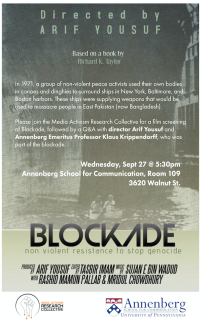Event

MARC is hosting a screening of Blockade, a film about peace activists in the early 1970s who used their bodies and canoes to block military ships carrying weapons to what is now Bangladesh. Professor Klaus Krippendorff was part of this action and will be there to answer questions in the Q&A, as will the filmmaker Arif Yousuf. The screening will start at 5:30pm in Room 109.
Blockade covers a series of events that started in June 1971 when the New York Times published a story that two Pakistani military ships were coming to the Eastern Seaboard of the US to load up arms supplied by the US government without the Congressional approval and despite official ban. The military was carrying out genocide of epic proportions, which led to a liberation war, and eventually the birth of a new nation, Bangladesh. This documentary tells the inspiring story of how a group of people in the Delaware Valley area (Philadelphia, Baltimore, Washington DC), irrespective of their nationality or religion, stood up in 1971 against the brutal oppression of the Pakistani military in Bangladesh, then East Pakistan.
The film follows the story of the Philadelphia resident peace activists Richard K. Taylor, Phyllis Taylor, Sally Willowghby; Penn Professors Dr. Klaus Krippendorff and Dr. Charles Khan; and Bengali expatriates then living in Philadelphia area Dr. Sultana Alam, Dr. Monayem Chowdhury, Mozharul Hoque, et al. Their non-violent activism eventually forced some of those ships to return empty. Amidst the denial of the US government, they came up with an idea to create public/media awareness by a symbolic blockade with canoes and dinghies in front of the oceangoing ships that were being used for supplying arms to Pakistan. The groups successfully organized non-violent protests and generated a huge national media interest on the matter. The activists then went on to influence other groups and make a substantial impact on public opinion here and overseas. Through interviews, archival TV footage and photographs, the film weaves in historical accounts of the genocide in Bangladesh, the misguided US foreign policy towards Pakistan at the time, and the common man’s protest against injustice.
Official Selection: 2017 International Freethought Film Festival, Orlando Florida
Disclaimer: This event may be photographed and/or video recorded for archival, educational, and related promotional purposes. We also video stream many of these video recordings through the Annenberg web site. By attending or participating in this event, you are giving your consent to be photographed and/or video recorded and you are waiving any and all claims regarding the use of your image by the Annenberg School for Communication. The Annenberg School for Communication, at its discretion, may provide a copy of the photos/footage upon written request.